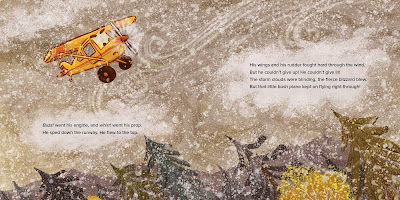 | |||
Hartman’s story in rhythmic, rhyming verse begins on a runway. First the mighty turboprop airplane displays its virtues, “sturdy and quick.” Next comes the cargo plane, “brawny and long,”
 |
followed by the jet plane, “her engines a-blast.” Finally we see the little bush plane off to the side, wondering, “I’m not strong. I’m not speedy. What good can I do?”
 |
| |
Well of course the little bush plane can — and does — do good. When the other planes fail to reach a pair of hikers caught in a snow storm, precisely because they are too big and too fast to land in a small clearing, the Littlest Airplane comes to the rescue.
 |
If the outcome is predictable to adults, it is nonetheless wholeheartedly satisfying, especially to little readers who are routinely told they aren’t big enough to do things.
What distinguishes this story, in addition to the setting, is the information intriguing to young minds interested in “things that go.” Take for instance this description of the little bush plane’s landing approach: “His strut-mounted wings gave him excellent sight./His speed? Not too fast. His propeller? Just right.” Illustrations by John Joseph capture the personalities of the planes while adhering to mechanical details, as well as conveying the feelings of speed and motion.
 |
Endpapers extend the story by setting the wilderness scene with just a hint of the drama to come, and at the end, returning quietly to wilderness. Final pages include an illustrated guide to “Parts of a Bush Plane,” as well as a note with further information about bush planes.
I can't resist adding that my two-year-old grandson loves this book. He insists that we return repeatedly to the pages that feature all four airplanes so he can compare and identify them. He enjoys trying out interesting terms like “turboprop” and “propeller” and "cargo plane." Discussions of wing placement and wheels have given rise to explanations of landing on the ground with wheels and on water with floats. He now searches airplanes overhead for evidence of wheels vrs. pontoons. Perhaps the Littlest Airplane will venture onto the water next? I know one little boy who would be thrilled!
